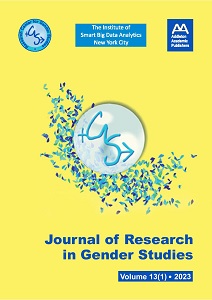Digital Clothing Try-on Apps, Augmented Reality Beautification Filters, and Artificial Intelligence-powered Mood Detectors in Body Image Disturbance
Digital Clothing Try-on Apps, Augmented Reality Beautification Filters, and Artificial Intelligence-powered Mood Detectors in Body Image Disturbance
Author(s): Sofia BratuSubject(s): Gender Studies, Media studies, Social Informatics, ICT Information and Communications Technologies
Published by: Addleton Academic Publishers
Keywords: digital clothing; try-on app; augmented reality; beautification filter; artificial intelligence; mood detector; body image disturbance;
Summary/Abstract: The aim of this systematic review is to synthesize and analyze augmented reality try-on lenses, 3D-rendered digital outfit, and artificial visual perception and deep-learning-based facial expression recognition systems. With increasing evidence of photo retouching apps, artificial intelligence-based speech synthesis and voice cloning, and 3D augmented reality try-on and multi-sensory perception technologies, there is an essential demand for comprehending whether context-aware emotion recognition and facial expression recognition technologies, augmented reality face filters, and deep learning and machine-based eye-tracking algorithms further visual imagery and representations. In this research, prior findings were cumulated indicating that generative artificial intelligence virtual try-on tools, digitally altered images, and 3D digital garment photorealistic simulations shape beauty ideal cultural constructions by use of cognitive and affective algorithms. A quantitative literature review of ProQuest, Scopus, and the Web of Science was carried out throughout February 2023, with search terms including “body image disturbance” + “digital clothing try-on apps,” “augmented reality beautification filters,” and “artificial intelligence-powered mood detectors.” As research published between 2020 and 2022 was inspected, only 164 articles satisfied the eligibility criteria, and 18 mainly empirical sources were selected. Data visualization tools: Dimensions (bibliometric mapping) and VOSviewer (layout algorithms). Reporting quality assessment tool: PRISMA. Methodological quality assessment tools include: AXIS, Distiller SR, ROBIS, and SRDR.
Journal: Journal of Research in Gender Studies
- Issue Year: 14/2024
- Issue No: 1
- Page Range: 86-100
- Page Count: 15
- Language: English
- Content File-PDF

